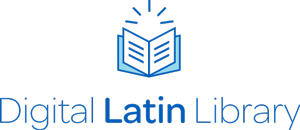-
Bellum Alexandrinum
Cynthia Damon, et al.
Society for Classical Studies
TEI XML encoding:
Samuel J. Huskey
Programming for automatic generation of TEI XML:
Virgina K. Felkner
Coauthor of content related to section 2.5:
Dallas Simons
Coauthor of content related to sections 12.1–2 and 13.5:
Tom Vozar
Coauthor of content related to section 26.1–2:
Marcie Persyn
Coauthor of content related to sections 35.3 and 36.4–5:
Maria Kovalchuk
Coauthor of content related to sections 47.2, 49.1, and 49.2–3:
Tim Warnock
Coauthor of content related to section 60.2:
Isabella Reinhardt
Coauthor of content related to sections 63.5 and 66.3–4:
Brian Credo
Coauthor of content related to sections 67.1 and 68.1:
Amelia Bensch-Schaus
Coauthor of content related to sections 72.2–3 and 74.4:
Wes Hanson
First Edition
The Digital Latin Library
650 Parrington Oval
Carnegie Building 101
Norman
OK
73071
USA
The University of Oklahoma
Norman, OK
2022
Creative
Commons Attribution-ShareAlike 4.0 International Licence (CC BY-SA 4.0)
Library of Digital Latin Texts
Edited by
Samuel J. Huskey
1
Born digital.
Acknowledgements
As we said at the outset, this edition rests on the work of many contributors. It
couldn’t have been done without them, or without the financial and other forms of
support for research provided by the Andrew W. Mellon Foundation and our two home
institutions, the University of Pennsylvania and the University of Oklahoma. Our
largest debts are recorded below, but the process has been a long one and we are
grateful to all who kept us company along the way, even on the “paths not (or not
yet) taken” that are an inevitable part of a project as complex as this one proved
to be. Information on the collaborations and support that resulted in the platform
and protocols that host and govern this edition can be found at the Digital Latin Library and the Library of Digital Latin
Texts.
Students at the University of Pennsylvania transcribed and collated the manuscript
witnesses and produced the text, critical apparatus, appendix critica, and
translation. The contributors were undergraduates, students in the Postbac
program, and graduate students in Classical Studies and Ancient History, along
with some Philadelphia-area high school students: Adrienne Atkins, Katie Becker,
Amelia Bensch-Schaus, Jacob Bickford, Nicholas Bolig, Victoria Burmeister, Sean
Carpenter, Greg Callaghan, Brian Credo, Maxwell Dietrich, Alexis Frankel, Kathleen
Garland, Nikola Golubovic, Wesley Hanson, Zachary Herbster, Xinyi Huang, Molly
Hutt, Johanna Kaiser, Elizabeth Keyser, Scheherazade Khan, Peter Kotiuga, Maria
Kovalchuk, Shenda Kuang, Amy Lewis, Scotland Long, Nicole Love, Daniel Mackey,
Kate Murphy, Addie McKenzie, Theodora Naqvi, Jeffrey Nolte, Kristen Patterson,
Marcie Persyn, Harrison Powell, Isaac Rand, Annamaria Rapsomanikis, Rudolf Rauk,
Isabella Reinhardt, Joshua Renfro, Janelle Sadarananda, Jessica Shaw, Dallas
Simons, Julia Simons, Brandon Stark, Benjamin Turnbull, Tom Vozar, Tim Warnock,
Joseph Watkins, Duo Xu, Yingchao Zhu. You will find the names of some of these
students in the edition itself as the sources of emendations to the text and
authors of notes on difficult spots in the text. Special mention goes to: Sean
Carpenter, who with the support of a grant from Penn’s Undergraduate Research
Mentoring Program developed a transcription protocol compatible with automatic
collation and produced directories of manuscript abbreviations; Dallas Simons, who
helped edit the apparatus notes and prepared page images from early editions for
Optical Character Recognition (one of those paths not yet taken, for which we also
received help and advice from Greg Crane, Uwe Springmann, and Katie Rawson); Amy
Lewis, who helped edit the apparatus notes and appendix critica; and Zachary
Elliott, who along with his wife Molly Cowan tested approaches to automating the
conversion of traditional apparatus notes into spreadsheet form. Support both
financial and technical was provided by Penn’s Price Lab for
Digital Humanities.
We owe a debt of gratitude to many people at the University of Oklahoma. Virginia
K. Felkner perfected the scripts used to reduce the amount of manual encoding we
had to do. Mark Laufersweiler and Tyler Pearson of the Data Analytics,
Visualization, and Informatics Syndicate provided invaluable advice on that and
other aspects of the project. Tara Carlisle, Director of the Digital Scholarship
Laboratory, facilitated meetings and made many helpful suggestions. Logan Cox made
important contributions to the DLL's digital infrastructure. The Office of the
Vice President for Research supported this and other DLL projects by providing
physical and virtual spaces for them.
Several people beyond the walls of the University of Pennsylvania and the
University of Oklahoma deserve special mention. Hugh Cayless (Duke University),
co-author of the "Guidelines for Encoding Critical Editions for the Library of Digital Latin
Texts" and architect of the application for reading this edition online,
has been instrumental in all aspects of this project. Tom Elliott (New York
University) and Alex Ward provided advice on scholarly and technical matters.
Finally, this project could not have come to fruition without the support of the
leadership of the Society for Classical Studies, particularly former Executive
Director Adam Blistein and current Executive Director Helen Cullyer and those who
have served as Vice President of Publications and Research during our work:
Michael Gagarin, Donald Mastronarde, Kathryn Gutzwiller, and Colin Whiting.

